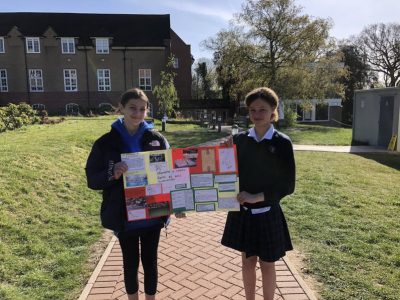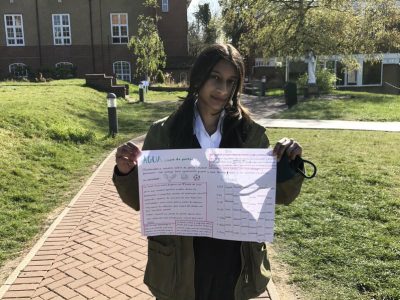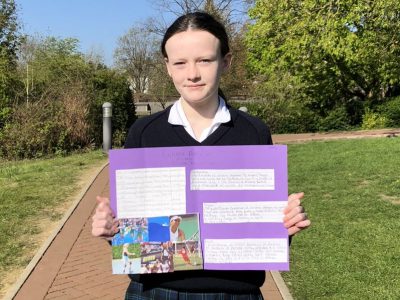Language learning in the Seniors
Spanish language and linguistics.
From Picasso to Colombia to linguistics – some of the topics covered by the podcasts and videos which have been enriching the language learning of Seniors. Girls have been enjoying learning about topics relating to Spanish, Spanish culture and language learning and we here produce some of the reports on their experiences.
Podcast: Colombia’s City of Women (BBC World Service ‘Outlook’)
By Sophia in Form III.
‘Colombia’s City of women was built by women rebuilding their own lives in the process. The houses were painted in bright colours, red, blue and yellow – specifically the colours of Colombia’s national flag. Many of the women living there had their lives ruined due to their past of being sexually abused. This whole concept started from a female lawyer; she saw what was happening and saw the terrible conditions that they had to live in. She then bought a large piece of land for these women who had a horrid past. However, this was not supported everywhere, their community centre was burnt, materials stolen, partners and builders were murdered. The community was harassed, and the women are still afraid of many things but stayed strong. “If women receive political power, only then will things get changed”
I think the idea of listening to podcasts is amazing, I really do believe that I personally benefit from it. It is really interesting to listen to and I learn a lot in a short space of time. It is relaxing and beneficial. In my opinion podcast should have been an activity since the start!
Language learning in Lower IV: Spanish projects on display
Podcast: Meeting Picasso (BBC World Service ‘Witness History’)
By Esinam in Form III.
‘Over the course of the year our Spanish group has been listening to many podcasts and my favourite one was Meeting Picasso. Picasso observed people all day and can be described as a vampire absorbing the energy out of the passers-by. He was a clear example of a person portraying the quote “The world is your canvas.” He was a multi-talented man but when it came to music and singing people said he was tone deaf. Picasso liked to watch bullfights when he was not painting – he even made a photo inspired by bull fighting. In all I believe that he was a humble, amusing and multi-talented man and I enjoyed learning a bit about him and how he saw the world.’
Language learning in Lower IV: Spanish projects on display
TED Ed video: The Benefits of a Bilingual Brain
By Rose Osborn in Upper IV
‘This term in Spanish we have looked at many videos and podcasts on the topic of being bilingual and languages in general. There was one video in particular about the benefits of a bilingual brain, I especially enjoyed this video as it provided lots of information about how the brain worked for a bilingual and how that differed from a monolingual brain. For example, children can learn languages easier than adults can, owing to the plasticity of their brains, which allow them to use both hemispheres in language acquisition, whereas in adults language is restricted to only using one hemisphere, usually the left. Learning a language in childhood may give you a more holistic grasp of its social and emotional context. Language ability is measured in two active parts; speaking and writing, and two passive parts; listening and reading. There are also three general types of bilingualism. Compound bilingualism means that you develop two linguistic codes simultaneously. Coordinate bilingualism, which means that you are learning a language at school, but speaking another language while you are at home with your family. Lastly, subordinate bilingualism is when you learn a secondary language by filtering it through their primary language. Overall, I would definitely recommend this video to people wanting to learn about bilingualism, or who are learning a second language fluently because it explains everything very clearly and it is generally an interesting topic to learn about.’
Language learning in Lower IV: Spanish projects on display
TED Ed video: How Languages Evolve
By Rachel Hiney in Upper IV
‘This term in Spanish, we have looked at different podcasts and videos about the topic of languages as a whole, one, in particular, was a TED talk on how languages evolve. I especially enjoyed this video as it educated me about the history of languages as well as how they continue to evolve today. The video explained how there are around 2000 to 8000 languages worldwide, which is why it is so hard to link each language back to its original branch – an example of this is Chinese, it is classified as a single language but it has multiple dialects that are mutually unintelligible. In the early days of human migration, the world was less populated, there were smaller tribes of people who had created their own language based on their location, weather, and different experiences of their people. Over time, the population continued to grow and evolve – causing those tribes to divide out further. I also learnt that modern linguists try to trace back these languages as far as they can using many different techniques to do so, these include; looking at the syntax and grammar or pronouns and numbers and kinship to look for regular patterns that might match with another language. They are also able to determine the geographical origins and lifestyles of the ancient people based on which of their vocabulary was native. Overall, I would defiantly recommend watching the TED talk on how languages evolved, it was informative, engaging and very interesting.’
Language learning in Lower IV: Spanish projects on display
Categories: Priory Post Senior Whole School





